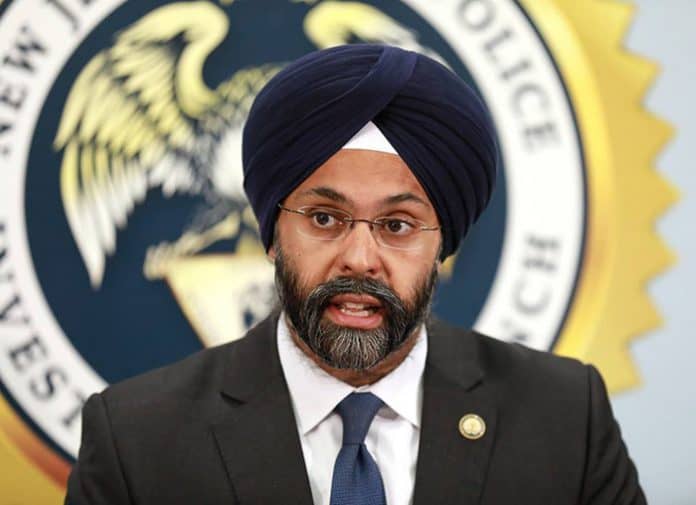
NEWARK – In response to a rise in police suicides nationwide, state officials are taking action to protect the physical and emotional well-being of New Jersey law enforcement officers with the “Officer Resiliency Directive.”
Attorney General Gurbir S. Grewal’s Officer Resiliency Directive implements the New Jersey Resiliency Program for Law Enforcement (“NJRP-LE’), a first-in-the-nation statewide program to train officers in resiliency and to become better equipped to handle the daily stress of police work that, when left unchecked, may lead to physical ailments, depression, and burnout.
With this, New Jersey will become the first state in the country to require that all state, county, and municipal law enforcement agencies designate a Resiliency Program Officer (RPO) who will be specifically trained in resiliency.
The directive also creates the new position of “Chief Resiliency Officer,” which will be responsible for ensuring implementation of the statewide program. Attorney General Grewal selected Robert Czepiel, the Chief of the Prosecutors Supervision and Training Bureau in the Division of Criminal Justice, as the state’s first-ever Chief Resiliency Officer.
“We cannot fully comprehend the emotional and mental stress that our law enforcement officers suffer on a daily basis,” said Attorney General Grewal. “We owe it to them to not only combat the stigma associated with seeking help, but also to give them the tools they need to deal with the stress and trauma they endure. It is our hope that this first-in-the-nation program will serve as a first line of communication allowing officers to unburden job stresses and provide them with the support they deserve. We can no longer allow them to suffer in silence.”
Not only is it a stress factor emotionally and mentally, but job stress puts officers at higher risk for health- and social-related issues, including high blood pressure, heart disease, diabetes, substance misuse, family and relationship stress, and self-harm.
According to a recent white paper commissioned by the Ruderman Family Foundation, a philanthropic organization, police officers are more likely to die by suicide than in the line of duty.
According to Blue H.E.L.P., a nonprofit organization that tracks and monitors law enforcement suicides, at least 167 officers died by suicide last year, more than the total number of line-of-duty deaths. In New Jersey, 37 law enforcement officers reportedly have died by suicide since 2016.
While these statistics might be surprising, they are actually believed to be conservative. Law enforcement suicides have been historically underreported.
The NJRP-LE is designed to change a culture in which officers are often reluctant to seek help for work-related stress. The program fosters an environment that encourages officers to communicate with each other and with their families, as well as emphasizes officers’ positive strengths, rather than their weaknesses.
“The constant exposure to society’s most difficult problems can take an emotional toll on law enforcement officers that, if not addressed, can build up over time, often with tragic consequences,” said Director Veronica Allende of the Division of Criminal Justice. “Our goal is to teach law enforcement officers how to recognize and manage that stress to remain mentally healthy and avoid going down a dark hole.”
The NJRP-LE is designed to work in tandem with existing programs, such as Employee Assistance Programs or the “Cop2Cop” program, that provide a support and referral structure for officers in need or in crisis.
“As the director of Cop2Cop for 20 years and the wife of a law enforcement professional, I firmly believe this innovative program provides a much needed service that our police community deserves,” said Cherie Castellano, Director of the Cop2Cop Program. “Law enforcement suicide prevention is fostered by building strength, as well as by responding to crisis needs. This project will create a needed continuum of law enforcement peer support. Resiliency officers in every community will partner to hand off to Cop2Cop for telephone-based peer support with our retired officer peer counselors and clinicians ensuring assessment and referral to our Cop2Cop provider network. In addition, we can refer our Cop2Cop callers to a Resiliency Officer from their community who can meet with them face-to-face. Both options offer ongoing peer support and a strength-based approach to preserving our most precious resource in New Jersey-our law enforcement officers.”
The NJRP-LE also protects the confidentiality of communications between a law enforcement officer and an RPO. Law enforcement officers will be provided a list of all RPOs throughout the state, giving them the option to speak to an RPO outside of their department.
“In recognition of the emotional and mental health challenges our law enforcement officers face every day and the secondary dangers associated with policing, it is essential to provide them with the necessary training, tools and resources to promote resilience and well-being,” said Pat Colligan, President of the New Jersey State Policemen’s Benevolent Association. “In its purest sense, this directive acknowledges and recognizes the dangers our law enforcement officers face on a daily basis and will be added to the tool box of programs already in place to protect our officers.”
This directive requires every law enforcement officer in the state to be trained in the NJRP-LE by the end of 2022. Training is a two-day program consisting of a combination of lectures and practical exercises. Every law enforcement agency in the state must also appoint at least one Resiliency Program Officer or “RPO” who, once trained, will be responsible for implementing the NJRP-LE in their agency.
Under the leadership of Maple Shade Police Chief Christopher Fletcher, law enforcement officers and command staff from Maple Shade are already trained in the NJRP-LE.
“My goal from the beginning with this training was to better equip officers to process and cope with the negative effects of trauma that they encounter on a daily basis. In Maple Shade specifically, my vision included caring for and training our family members and Chaplain Corp in an effort to strengthen and educate the support systems around us,” said Chief Christopher J. Fletcher of the Maple Shade Police Department. “I enthusiastically support the expansion of this program throughout the State of New Jersey and am grateful that officer wellness is taking such a priority for Attorney General Grewal and Director Allende. In the end, this program helps to reshape the lens that we use to look at the world around us with an improved attitude and thankful disposition and that is something which is certainly good for everyone involved.”
This Directive was put together with help the Division of Criminal Justice, Burlington County Prosecutor’s Office, Ocean County Prosecutor’s Office, New Jersey State Police, Acadia Healthcare, The New Jersey Chaplains Association, Atlantic County Sheriff’s Department, Maple Shade Police Department and the New Jersey Division of Mental Health and Addiction Services.
“I would like to thank Attorney General Grewal for working hard to put this resiliency program together with the help of our all law enforcement groups,” said Robert W. Fox, President of the New Jersey State Fraternal Order of Police. “This program is well overdue to protect our officers that protect our citizens every day. It is quickly forgotten by the public how dealing with tragedies, such as our last two recent ones, in El Paso and Dayton, will haunt these officers during their careers and have lasting effects on them and their families. I would like to thank General Grewal from the members of the New Jersey State Fraternal Order of Police.”






